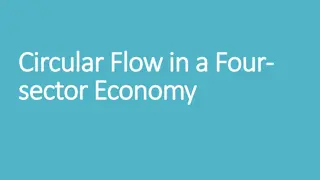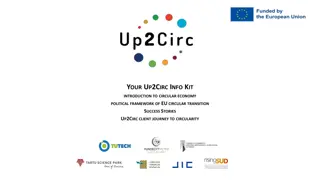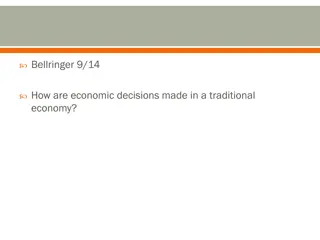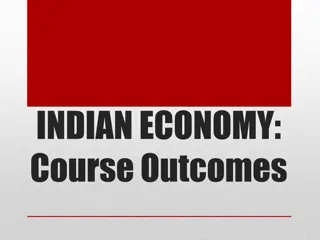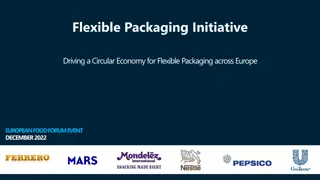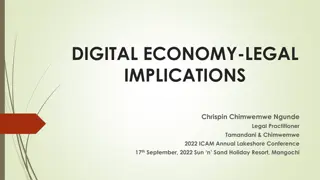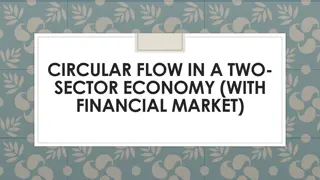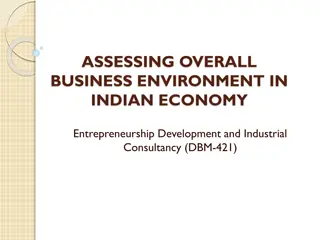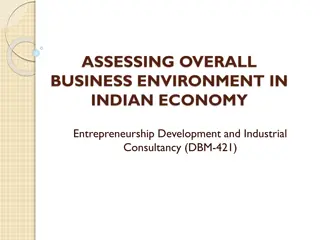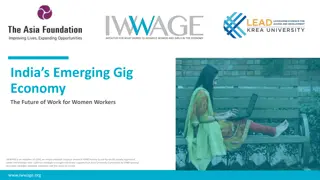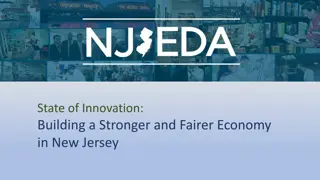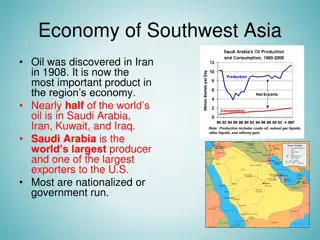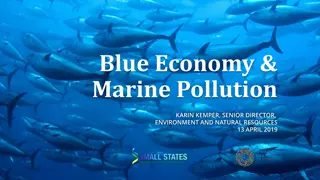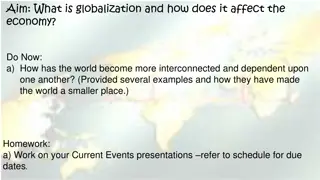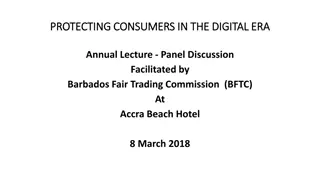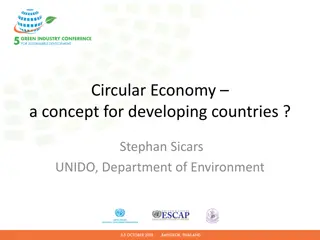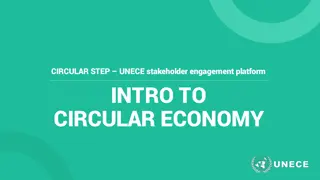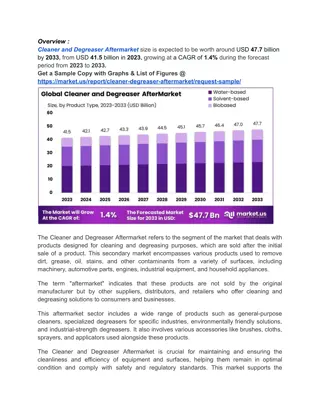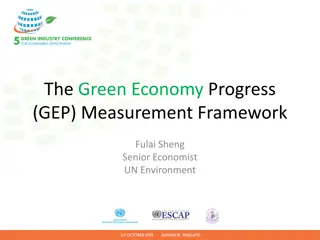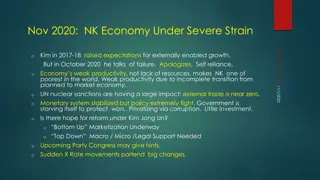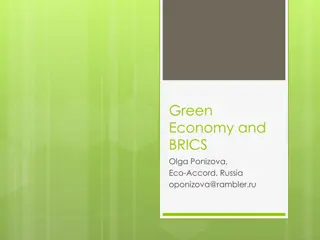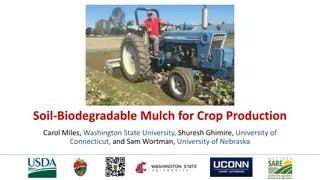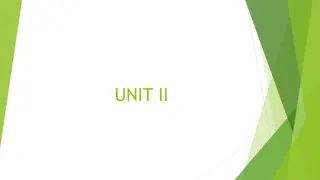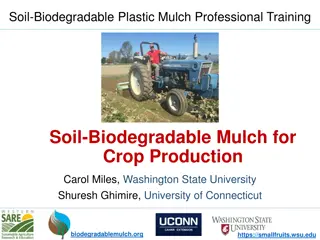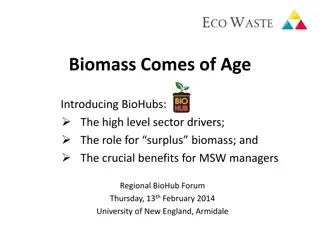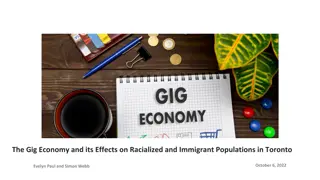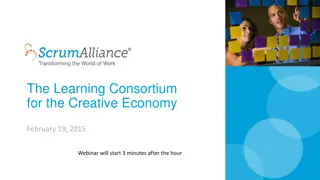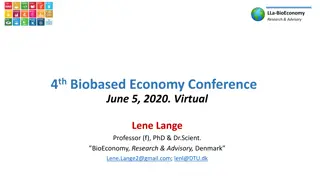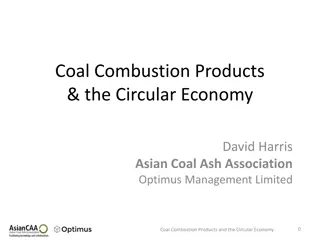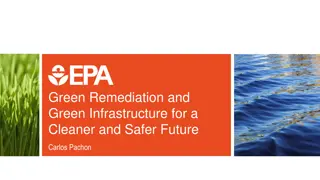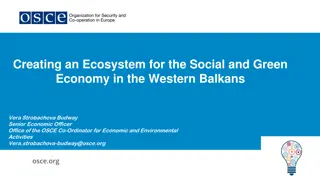Sustainability and the Blue Economy Concepts
The intertwining concepts of sustainability and the blue economy, focusing on historical developments, environmental protection events, and the emergence of sustainability science. Discover the pillars supporting a sustainable blue economy and pathways for inclusive development.
15 views • 40 slides
Understanding Voluntary Sustainability Schemes: ISCC and REDcert
Explore the principles and methods of Voluntary Sustainability Schemes (VS) such as ISCC and REDcert, focusing on mass balancing to implement and document sustainability measures. Learn how these methods can support sustainability claims and bio-content initiatives. Gain insights from Maja Henriksen
3 views • 17 slides
Circular Flow in a Four-Sector Economy Explained
The circular flow in a four-sector economy involves households, firms, government, and the foreign sector. Each sector plays a crucial role in money flows and payments, contributing to the continuous flow of income. The financial market also has a significant impact on the economy by accumulating sa
3 views • 8 slides
Glossary of Key Terms
Explore essential terms in economics such as command economy, consumer, demand, economic system, free enterprise system, goods, innovation, market economy, marketplace, mixed economy, needs, producer, profit, resources, scarcity, services, supply, technology, trade-off, traditional economy, and want
3 views • 6 slides
Accelerating Towards a Circular Economy Future
The circular economy presents a vital solution to tackle climate change by focusing on regenerative growth, reducing resource consumption footprint, and enhancing material use efficiency. The EU's Circular Economy Action Plan aims to usher in a sustainable future through decoupling economic growth f
2 views • 19 slides
Leveraging Non-Oil Exports for Nigeria's Blue Economy Growth
Nigeria Export Promotion Council (NEPC) focuses on diversifying Nigeria's economy by promoting non-oil exports for sustainable growth. The Blue Economy concept involves sustainable use of ocean resources for economic development. Nigeria's abundant ocean resources such as maritime transportation, fi
0 views • 20 slides
Economic Systems in the United Kingdom, Germany, and Russia
Economic decisions in traditional economies are based on customs and beliefs. The United Kingdom has a mixed market economy with a focus on service industries, while Germany's economy is export-based. Russia's economy leans towards a command system. By comparing these economic systems, one can see h
0 views • 11 slides
Understanding Indian Economy: Course Outcomes and Resources
Explore the course outcomes of the Indian Economy, covering economic development, policies, population growth, planning, agriculture, Kerala's economy, and resources for further study. Access government data and publications on the Indian economy for comprehensive learning.
0 views • 9 slides
Advancing Circular Economy Through Flexible Packaging Initiative
Flexible Packaging Initiative is driving a circular economy in Europe by emphasizing the importance of flexible packaging, showcasing key benefits, and outlining steps to ensure circularity in the recycling value chain. The initiative supports harmonized sorting labels, eco-modulated fees, and the p
5 views • 5 slides
Legal Implications of the Digital Economy in Malawi
Explore the legal implications of the digital economy in Malawi as discussed at the ICAM Annual Lakeshore Conference. Topics include the Electronic Transactions and Cyber Security Act, principles of implementation, Malawi CERT, data privacy, and the significance of the digital economy in transformin
0 views • 44 slides
Understanding Circular Flow in a Two-Sector Economy with Financial Market
In a two-sector economy with a financial market, households and firms engage in savings, investments, and borrowing through the financial market, unlike the simple circular flow assumption where no savings are made. This interaction between households, firms, and the financial market plays a crucial
0 views • 4 slides
Overview of Modern Business Environment in Indian Economy
Modern business in the Indian economy is characterized by large size, oligopolistic nature, diversification, global presence, technology orientation, and changing government regulations. The Indian economy features a mixed economy with both private and public enterprises, low per capita income, uneq
0 views • 14 slides
Overview of Business Environment and Economy in India
Business environment in India encompasses a mix of large, oligopolistic, diversified, and technologically oriented enterprises. The Indian economy is characterized by a mixed economy, low per capita income, and limited entrepreneurial potential. External and internal factors influence business opera
0 views • 14 slides
Insights into India's Thriving Gig Economy and Future Work Trends
India's gig economy, spearheaded by initiatives like IWWAGE, is reshaping the future of work, particularly for women. Key questions revolve around the gig economy's impact, legislative frameworks, and COVID-19 repercussions. Academia investigates the rise of gig work, focusing on platforms like Uber
0 views • 11 slides
Transforming New Jersey's Economy for Growth and Equality
New Jersey aims to revitalize its economy by focusing on key goals for 2025, including driving job growth, increasing wages, fostering diversity in STEM fields, erasing gender and racial wage gaps, and reducing poverty in urban centers. The plan involves investing in people, communities, innovation,
3 views • 5 slides
Strategic Creativity in Tourism Business: Unleashing Innovation and Growth
Explore the dynamic landscape of strategic creativity in tourism business through the lens of the experience and attention economy. Discover how creativity-based approaches can reshape planning and generate novel opportunities in the tourism sector. Delve into the concepts of the experience economy,
5 views • 14 slides
Economy of Southwest Asia: Oil, OPEC, and Cultural Influences
Oil discovery in Southwest Asia transformed the region's economy, with OPEC playing a key role in pricing. Primary products like oil and secondary goods influence the economy. Islam shapes the culture, while debates on Westernization persist.
1 views • 10 slides
The Blue Economy and Marine Pollution: A Comprehensive Overview
The presentation outlines the thriving ocean economy, the concept of the Blue Economy, the World Bank's approach, risks faced by oceans, and the impact of marine pollution on Small Island Developing States and coastal regions. It emphasizes sustainable development of oceanic activities, collaboratio
1 views • 12 slides
Understanding Globalization's Impact on the Economy
Globalization is the increasing unification of the world's economy, leading to greater interconnectedness and interdependence among nations. It has facilitated the exchange of products, services, and ideas globally, impacting economies worldwide. While it offers benefits such as increased productivi
0 views • 10 slides
Consumer Protection in the Digital Economy: Challenges and Solutions
Exploring the relevance of consumer protection in the digital economy, this content delves into defining the digital economy, top countries in retail internet sales, and initiatives like the CARICOM Model Consumer Protection Bill. It addresses issues of jurisdiction in cross-border transactions and
0 views • 9 slides
Circular Economy as an Opportunity for Developing Countries
Circular economy presents an opportunity for developing countries to generate wealth, reduce environmental footprint, and promote sustainable practices. By extending product lifetimes, reusing resources, and minimizing waste, developing nations can benefit from economic interests while complementing
0 views • 9 slides
Introduction to Circular Economy and UNECE Stakeholder Engagement
Explore the concept of Circular Economy focusing on reducing, reusing, recycling, and recovering materials for economic sustainability and environmental quality. Learn about UNECE's role in promoting circular economy principles, stakeholder engagement, and activities aimed at sustainable resource ma
0 views • 4 slides
Global Health Crises Drive Demand for Cleaning Solutions in Aftermarket
Cleaner and Degreaser Aftermarket By Part Types(Cleaner Aftermarket, Degreaser Aftermarket), By Product Type(Water-based, Solvent-based, Biobased), By Application( Automotive, Aerospace, Marine, Machinery and Equipment, Building and Construction, Oth
0 views • 4 slides
The Green Economy Progress Measurement Framework Overview
The Green Economy Progress (GEP) Measurement Framework, spearheaded by Fulai Sheng, a Senior Economist at UN Environment, emphasizes an Inclusive Green Economy (IGE) as a tool for sustainable development. It addresses poverty, inequitable prosperity sharing, and planetary boundary concerns by integr
0 views • 6 slides
Challenges and Transitions in North Korea's Economy
North Korea's economy faces severe strain due to weak productivity and external sanctions. Transitioning from a planned to a market economy has been incomplete, leading to low investment and corruption. The upcoming Party Congress may offer clues on reform under Kim Jong Un. Marketization, trade par
0 views • 15 slides
Insights into Social Economy and Social Dialogue Research Outcomes
Research outcomes from the Mesmer+ project at HIVA KU Leuven reveal misalignments in social dialogue inclusiveness, challenges faced by social economy entities, and the role of employers in the social economy. Recommendations include enhancing the role of social economy employers and promoting inclu
1 views • 7 slides
Entrepreneurship and Innovation in the Green Economy Conference Overview
This overview highlights the program's focus on green economy innovation, educational policies, and collaboration with international partners. It delves into Latvia's challenges and the significance of green innovation entrepreneurship in driving radical changes. The narrative extends to the Europea
0 views • 21 slides
Exploring the Green Economy and BRICS Cooperation
The discussion focuses on the importance of the green economy for BRICS nations, suggesting ways for collaboration, especially in addressing climate change and transitioning to a low-carbon economy. The BRICS countries play a crucial role in global stability and sustainable development. Features of
0 views • 22 slides
Sustainable Mulching Practices for Enhanced Crop Production
Implementing soil-biodegradable mulch in crop production offers an eco-friendly alternative to traditional polyethylene mulch. Benefits include weed control, soil moisture retention, and temperature regulation, with comparable yields to polyethylene mulch. Certified biodegradable options are availab
0 views • 8 slides
The Impact of Pandemics on the Shadow Economy Performance
Pandemics have a significant impact on the shadow economy, influencing the legal economy in various ways. The shadow economy serves as a buffer for high unemployment rates and can contribute to budget revenues through legal spending. Studies suggest that a growing shadow economy may reflect dissatis
0 views • 12 slides
Evolution of Services Marketing in the Modern Economy
The shift towards a service economy has transformed marketing practices, leading to the emergence of Services Marketing as a distinct discipline. This evolution highlights the unique characteristics of services, such as intangibility and simultaneous production-consumption. The 1980s mark a pivotal
0 views • 13 slides
Exploring Soil-Biodegradable Plastic Mulch for Sustainable Crop Production
Discover the benefits of using soil-biodegradable plastic mulch as an alternative to traditional PE mulch in crop production. Learn about its environmental advantages, efficient removal methods, impact on yield and weed control, and compliance with USDA's organic program. Find insights on biodegrada
0 views • 9 slides
Exploring the Evolution of Biomass in BioHubs for Sustainable Resource Management
Advancements in biomass utilization through BioHubs offer a sustainable solution to address global agendas like climate change and resource depletion. Biomass serves as a crucial alternative to fossil fuels, providing a renewable source for essential carbon-based molecules. Various biomass sources,
0 views • 17 slides
Understanding the Impact of the Gig Economy on Marginalized Groups in Toronto
This report delves into the effects of the gig economy on racialized and immigrant populations in Toronto. It outlines research findings, stakeholder insights, and strategic recommendations to address the challenges faced by marginalized groups in the gig economy. The study aims to shed light on the
0 views • 25 slides
The Learning Consortium for the Creative Economy Webinar Summary
The webinar on The Learning Consortium for the Creative Economy discussed key topics such as agenda details, presenters' backgrounds, poll results, and insights on the Creative Economy and its importance. Participants engaged in discussions on topics like the Recap on the Creative Economy, Scaling o
0 views • 43 slides
Innovations in Biobased Economy: Shaping a Sustainable Future
Explore the latest developments in the biobased economy presented at the 4th Biobased Economy Conference. Discussions include enhancing value from biomass, circular textile industry advancements, biobased products addressing societal challenges, and new business models for SMEs in the biobased era.
0 views • 6 slides
Coal Combustion Products & the Circular Economy - Addressing Resource Flow Challenges
This discussion delves into the intersection of coal combustion products and the circular economy, emphasizing the need for continuous re-evaluation of resource chains, ecosystem metabolisms, and industrial innovations to ensure sustainable environmental practices and economic growth. Exploring the
0 views • 24 slides
Green Remediation and Green Infrastructure for a Cleaner Future
Addressing environmental challenges through green remediation and infrastructure practices, focusing on reducing environmental footprints, incorporating sustainability elements, and utilizing greener cleanup techniques like native grass species and biobased products. The ASTM guide provides a standa
0 views • 8 slides
Understanding Soil-Biodegradable Plastic Mulch in Agriculture
Soil-biodegradable mulch, a sustainable alternative to polyethylene mulch, offers benefits like weed control, moisture retention, and increased crop yield. Introduced in the 1990s, these mulches are made from various biobased polymers and feedstocks, with considerations for biodegradation and GMOs i
0 views • 10 slides
Advancing Social and Green Economy in Western Balkans
Creating an ecosystem for social and green economy in the Western Balkans is crucial for fostering peace, reducing disparities, and promoting sustainable business models. Initiatives like promoting innovation, job creation, and skills development among young entrepreneurs are key to driving growth a
0 views • 7 slides


